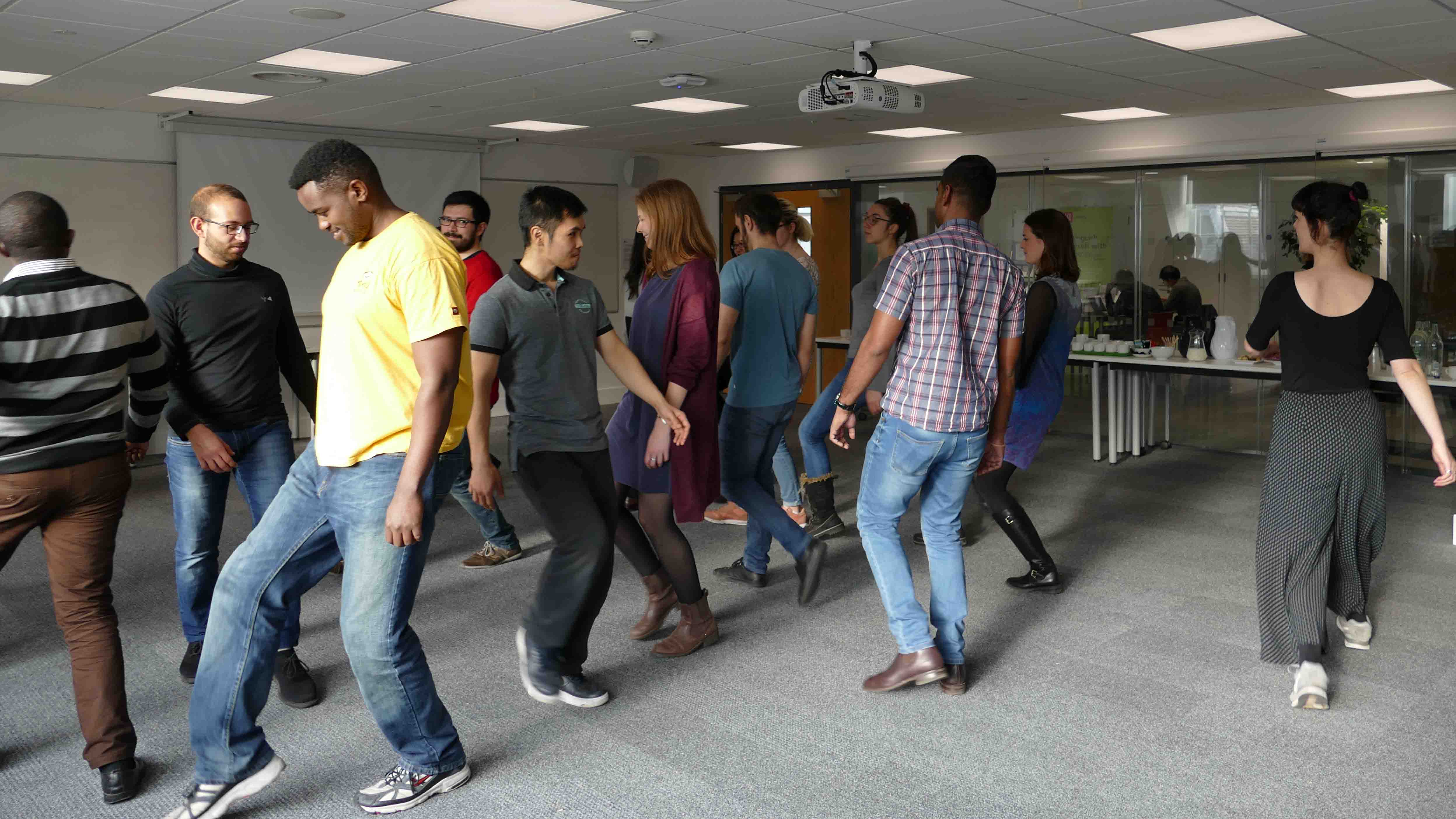

ME305 Qualitative Research Methods
Course info.
Dr Aliya Rao & Dr Chana Teeger
The purpose of this course is to equip participants with the skills to be able to sensitively and critically design, carry out, report, read, and evaluate qualitative research projects, focussing on in-depth interviews and participant observation.
It is taught by qualitative research experts who have experience of using the methods they teach. It covers the full cycle of a field-based qualitative research project: from design, to data collection, analysis, reporting and dissemination.
The course has the dual aims of equipping students with conceptual understandings of current academic debates regarding methods, and the practical skills to put those methods into practice.
Fetching learning content...
MY428 Half Unit Qualitative Text and Discourse Analysis
This information is for the 2020/21 session.
Teacher responsible
Dr Audrey Alejandro COL.7.10
Availability
This course is available on the MSc in Applied Social Data Science, MSc in Culture and Conflict in a Global Europe, MSc in Culture and Conflict in a Global Europe (LSE & Sciences Po), MSc in Culture and Society, MSc in Development Studies, MSc in Gender (Research), MSc in Gender, Media and Culture, MSc in Human Geography and Urban Studies (Research), MSc in Inequalities and Social Science, MSc in International Social and Public Policy (Research) and MSc in Social Research Methods. This course is available as an outside option to students on other programmes where regulations permit.
This course is freely available to any MSc or MRes students interested in text and discourse analysis.
The course is also available to PhD students interested in text and discourse analysis, please see MY528.
Pre-requisites
There are no prerequisites but some prior training in research methods is expected (including finding bibliographical resources, conducting a literature review, creating one's own research question...). Please contact the course convenor if unsure.
Course content
How can we use texts and discourses to create meaning about the social world? The goal of this course is to provide students with the skills to construct and conduct social sciences research using text and discourse as an entry point. While acquiring these skills, students also learn how to interpret textual data by exploring the concepts and case studies developed across disciplines. The course both establishes a theoretical foundation for text/discourse analysis and takes a practical and applied approach, so that students can acquire greater independence and confidence to conduct their research project autonomously.
Discourse Analysis is the overarching method that structures the content of the course. The first part of the course focuses on the application of the most common methods used to analyse texts and discourses (including thematic analysis and content analysis). The second part of the course places the in-depth analysis of texts in the broader context of research methods and design, to ensure students know how to critically self-assess their work and produce research to the highest standards. Beyond learning the skills of qualitative text/discourse analysis, this course is an invitation to produce more structured, analytical and critical research capable of grasping not only the visible but also the invisible and implicit dimensions of politics and society. Examples from across the social sciences will be used throughout the lectures and seminars.
15 hours of lectures and 15 hours of seminars in the LT. This year, some or all of this teaching may be delivered through a combination of virtual classes and flipped-lectures delivered as short online videos. This course has a Reading Week in Week 6 of LT.
Formative coursework
A project proposal (c.1,000 words) focusing on the topic that the student will develop in their summative assignment. The project proposal comprises a blog post and a project outline.
Indicative reading
Baker, P. and Ellece, S. (2010). Key Terms in Discourse Analysis, London: Continuum. Dunn K. and Neumann I. B. (2016). Undertaking Discourse Analysis for social research, Ann Arbor: University of Michigan Press. Kuckartz U. (2014). Qualitative text analysis: a guide to methods, practice & using software. Los Angeles: Sage. Scheier, M. (2012). Qualitative Content Analysis. Sage, Thousand Oaks, CA.
Research proposal (100%) in the ST.
A research proposal (100%, 4000 words) in the ST. Students can base their research proposal on a dimension/sub-question of their dissertation topic (or a related topic, e.g. a PhD proposal) subject to the approval of their home department.
Important information in response to COVID-19
Please note that during 2020/21 academic year some variation to teaching and learning activities may be required to respond to changes in public health advice and/or to account for the situation of students in attendance on campus and those studying online during the early part of the academic year. For assessment, this may involve changes to mode of delivery and/or the format or weighting of assessments. Changes will only be made if required and students will be notified about any changes to teaching or assessment plans at the earliest opportunity.
Department: Methodology
Total students 2019/20: 28
Average class size 2019/20: 9
Controlled access 2019/20: Yes
Value: Half Unit
Personal development skills
- Self-management
- Team working
- Problem solving
- Application of information skills
- Communication
Browser does not support script.
- Autumn Term events schedule
- Student Voice
- You've got this
- LSE Volunteer Centre
- Key information
- My Skills and Opportunities
- Student Wellbeing Service
- PhD Academy
- LSE Careers
- Student Services Centre
- Timetable publication information
- Students living in halls
- Faith Centre

Methodology training
The Department of Methodology at LSE provides specialist training in advanced qualitative and quantitative methods.
Much of what they do is geared towards doctoral students and will take place in the teaching room in the PhD Academy on the 4th floor of the LSE Lionel Robbins building (see maps and directions ).
Doctoral students are welcome to attend any of the department's courses but are advised to discuss departmental requirements for training and the courses which would be of particular benefit to them with their supervisors.
Methods surgeries
The Department of Methodology also runs a walk-in Methods Surgery where staff and students can drop in for advice on methods-related problems they may have. Two members of staff, one with a background in quantitative methods and the other in qualitative methods, will be present at each session to help with a range of methodological problems.
The Methods Surgeries run during term time only
Please email [email protected] if you need advice.

Software tutorials
The focus in the methods surgeries is on methods, not software. The Department of Methodology have produced a series of online tutorials to support staff and students with software packages SPSS and Stata.

Events, courses and training Academic professional development and coaching
Academic and professional development Development programme and coaching opportunities

Careers advice Information for research students

SO492 Qualitative Social Research Methods
Course info, fetching learning content....
- University home
- For business
- Alumni and supporters
- Our departments
- Visiting us
Approaches in Qualitative Evaluation
2019 july - qualitative evaluation.
Evaluation research is concerned with establishing and understanding the effects of interventions in a variety of policy, programming and organisational settings. Such research is often oriented primarily towards summative evaluation, or towards quantifying the effects of interventions using numeric input and outcome data. In many cases, however, in order to explore the mechanisms through which interventions have effects in particular contexts complementary qualitative evaluation approaches are required. This workshop will introduce key approaches in qualitative evaluation, the purposes of these various approaches, the methods involved, and how they can be used in conjunction with more conventional summative evaluation approaches.
Instructor profile
Alasdair Jones is Assistant Professor in Qualitative Research Methodology and the Director of the MSc Social Research Methods at the Department of Methodology, LSE. He is an interdisciplinary scholar and methodologist with particular expertise in the fields of urban studies and programme evaluation. Underpinning his research – which has been funded by ESRC, NCRM, NIHR, UKPRP and the US-UK Fulbright Commission – is a guiding theoretical interest in exploring (using qualitative methods ) disconnects between policy expectations/design intentions and practices.
Alasdair teaches or has taught on a range of postgraduate research design and qualitative research methods courses at the LSE. These include: Fundamentals of Social Science Research Design ; Research Design for Studies in Digital Innovation ; Research Methods for Evaluation in Health, Development and Public Policy ; Qualitative Research Methods ; Doing Ethnography ; and Advanced Qualitative Research Workshops . In addition, he has co-taught the NCRM short course and the Ethnographic Methods and Practice course for the LSE Methods Summer School. Alasdair has degrees in Geography (BA [Hons]) and Sociology (MPhil) from the University of Cambridge and he received his ESRC-funded PhD from the LSE’s Department of Sociology (Cities Programme).

IMAGES
VIDEO
COMMENTS
Qualitative Research Methods ... It is designed to help prepare you for summative assessment which counts towards the course mark and to the degree award. LSE uses a range of formative assessment, such as essays, problem sets, case studies, reports, quizzes, mock exams and many others. Summative assessment may be conducted during the course or ...
The purpose of this course is to equip participants with the skills to be able to sensitively and critically design, carry out, report, read, and evaluate qualitative research projects, focussing on in-depth interviews and participant observation. It is taught by qualitative research experts who have experience of using the methods they teach.
SO492. Half Unit. Qualitative Social Research Methods. This information is for the 2021/22 session. Dr Carrie Friese STC S213. This course is compulsory on the MSc in Culture and Society. This course is available on the MPhil/PhD in Cities Programme, MPhil/PhD in Sociology, MSc in City Design and Social Science, MSc in Economy and Society, MSc ...
MY421/MY521 - Qualitative Research Methods. The course equips students with the tools, imagination and independence for conducting qualitative research for the first time. The course equips students with the tools, imagination and independence for conducting qualitative research for the first time.
Information for prospective students MSc Social Research Methods is now open for 2023/24 applications. Visit the MSc in Social Research Methods online prospectus page.. MSc Social Research Methods will provide you with the opportunity to develop sophistication in research design and quantitative and qualitative research, and to undertake courses in one or more social science disciplines.
The purpose of this course is to equip participants with the skills to be able to sensitively and critically design, carry out, report, read, and evaluate qualitative research projects, focussing on in-depth interviews and participant observation. It is taught by qualitative research experts who have experience of using the methods they teach.
MY428. Half Unit. Qualitative Text and Discourse Analysis. This information is for the 2020/21 session. Dr Audrey Alejandro COL.7.10. This course is available on the MSc in Applied Social Data Science, MSc in Culture and Conflict in a Global Europe, MSc in Culture and Conflict in a Global Europe (LSE & Sciences Po), MSc in Culture and Society ...
The Department of Methodology runs two master's programmes and two Doctoral programmes: The Department also runs a Visiting Research Student in Social Research Methods scheme. Our students join the Department of Methodology from all over the world and at varying stages in their careers. The Department provides an extensive range of courses ...
We take around 80 postgraduate students each year from a range of backgrounds and provide teaching to thousands of LSE students who take our courses and workshops. The Department of Methodology ensures that LSE's students and staff have the expertise and training available to maintain the School's excellence in social scientific research.
The Department of Methodology at LSE provides specialist training in advanced qualitative and quantitative methods.. Much of what they do is geared towards doctoral students and will take place in the teaching room in the PhD Academy on the 4th floor of the LSE Lionel Robbins building (see maps and directions).. Doctoral students are welcome to attend any of the department's courses but are ...
In this course you will be introduced to the basic ideas behind the qualitative research in social science. You will learn about data collection, description, analysis and interpretation in qualitative research. Qualitative research often involves an iterative process. We will focus on the ingredients required for this process: data collection ...
You can choose a qualitative research methods course that provides a thorough overview and the intermediate-level skills needed for data collection and analysis. You'll have a variety of course and specialization options available from Coursera's global partners, which include Emory University, University of Amsterdam, and SOAS University of ...
SO492 Qualitative Social Research Methods. No summary. Enter course
Instructor profile. Alasdair Jones is Assistant Professor in Qualitative Research Methodology and the Director of the MSc Social Research Methods at the Department of Methodology, LSE. He is an interdisciplinary scholar and methodologist with particular expertise in the fields of urban studies and programme evaluation. Underpinning his research ...
This course moves beyond the basics of qualitative methodology, to consider a number of advanced methods for collecting data - namely object, elite and mobile interviewing. ... The course leader is an experienced social researcher who will draw on her own research and use of these methods, as well as established practice within the social ...